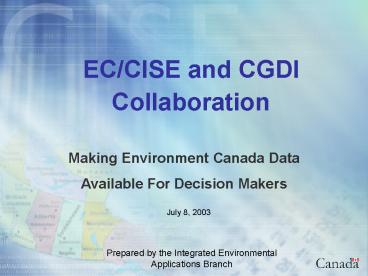Making Environment Canada Data - PowerPoint PPT Presentation
1 / 24
Title:
Making Environment Canada Data
Description:
Map/metadata search services. Water quality index. NAPS. Discovery. Discovery ... Metadata To Map. WQI Services For Newfoundland. Data Extraction Services Development ... – PowerPoint PPT presentation
Number of Views:22
Avg rating:3.0/5.0
Title: Making Environment Canada Data
1
EC/CISE and CGDI Collaboration
Making Environment Canada Data Available For
Decision Makers
July 8, 2003
Prepared by the Integrated Environmental
Applications Branch Knowledge Integration
Directorate, Environment Canada.
2
ECs Past..
3
- Fragmented CoP across the department
- Limited communications
- Duplication of effort and data acquisition
- Inconsistent data/information management
practices - Significant expenses in data and software
acquisition - Limited awareness and involvement beyond CoP
itself.
Regional Geomatics Staffing Distribution
Note Based on 2000 CoP survey (approx 120 staff).
4
ECs Present..
5
Regional COTS Geomatics Software/Expertise
Prairie and Northern ESRI (ArcView, Mapinfo,
Atlas GIS)
Quebec ESRI (ArcIMS, ArcView), MapInfo,
MapXtreme, MapGuide
PY ESRI (ArcView, ArcIMS, SDE, Freshmaps)
Atlantic ESRI (ArcView), Autodesk MapGuide,
MapServer
Ontario (incl NCR) ESRI (ArcInfo, ArcView,
ArcIMS, SDE), MapGuide, MapServer
Note Does not include remote sensing expertise.
6
Promoting The Canadian Geospatial Data
Infrastructure (CGDI)
- Develop a network of people, data, services and
applications to enable discovery, sharing and use
of geospatial data and information. - Promote an open information technology
infrastructure, based upon publicly available
specifications (ie. FGDC/ISO, OGC WMS/WFS, etc.)
(vendor neutral concept). - Implementation of systems to support service
providers, data providers and application
developers, using interoperable and re-usable
components.
7
Postal Code Lookup Example
ECs Use of the CGDI Web Services
8
EC/CISE/CGDI Development Activities
- Metadata Development
- ECMeta
- XChainJ
- Station Level metadata development
- Data Visualization
- Map/metadata search services
- Water quality index
- NAPS
9
Metadata Services
DiscoveryMost EC information assets will be
described at this simplest level. This could be
for a collection or single record.
A flexible strategy that matches effort to need
AccessThis level will be used to provide
detailed access to scientific information
holdings.
Exchange
ExchangeUsing the full geospatial and/or
biological profile to enable the comprehensive
disclosure and exchange of data.
Using internationally recognized standards
10
Metadata To Map
11
WQI Services For Newfoundland
12
Data Extraction Services Development
13
Environment Canadas Ongoing Geomatics CoP
Initiatives
- GIS Users and GIS News departmental listservs
- Currently 290 subscribers (most are EC staff)
- Share knowledge, skills, data, best practices
- How to Subscribe?
- Send an email message to majordomo_at_cmc.ec.gc.ca
- with the command "subscribe" followed by the list
name in - the body of the message (not in the subject line)
ie. - subscribe GIS_users or subscribe GIS-news
(depending - on which list you want).
14
ECs Geomatics Activities
- Departmental licensing for NTDB Framework data
- Interdepartmental Web Mapping Committee
- Inter Agency Committee on Geomatics
- GeoNet Concept Development
- Funding through Innovation and Learning Fund
- Promote standards approach to IM
- Coordinate regional geomatics activities
- Marketing of geomatics CoP activities to broader
- audience, internally and externally.
15
Our Future..
16
GeoNET
What is it? An Environment Canada network of
excellence in geomatics. What role will it
play? Its primary objective is to become the
authority for geomatics activities in Environment
Canada recognizing our distributed skills and
expertise. How will it function? A coordinated
network led by a dedicated Manager and a Board of
Directors will represent the Environment Canada
nodes of geomatics expertise across our
organizational structure and priority issues.
17
GeoNET Will
- Develop a foundation for access to Environment
Canadas geospatial information - Support and coordinate intra and inter
departmental activities (ie. CISE, NLWIS, NFIS,
OCIPEP, Species at Risk, Climate Change, etc) - Promote and sustain a connected network of
geomatics specialists - Become a Departmental Resource Centre where
project managers go for advice and access to
knowledge and skills.
18
GeoNET Benefits
- Promote and enhance the access and use of
internal geomatics expertise throughout the
department for effective decision making - Cost savings by avoiding duplication of effort
- Promote compliance with international information
management standards in coordination with CGDI - Enhance access to Environment Canada data and
information for internal and external partners
(NFIS, NLWIS, OCIPEP, etc) - Develop opportunities for training and learning
in areas related to geomatics
19
GeoNET e-Learning Development
20
Endorsing CGDI/OGC Working In Partnership
- Reduce application development time by using a
lessons learned approach. - Framework Development (eg Geobase Contributions).
- Foster fed/prov/mun opportunities.
- Partnerships agreements ( e.g. NFIS,NLWIS,OCIPEP).
- Developing Policies (e.g. through the IACG).
- Endorse Office of Primary Interest (OPI) concept.
- Environmental Frameworks.
- (e.g. drainage basins, ecological boundaries,
protected areas)
21
The Canadian Water Information SystemCANWIS
Development
- Develop an Integrated Water Project
- Rely on Past Successes
- Link with other Water Initiatives
- Partner with the Provinces and Others
22
CANWIS System Design
23
Thank you and stay tuned to.
24
Environment Canadas..
GeoNet
Integrated Environmental Applications
Branch/Knowledge Integration Directorate































